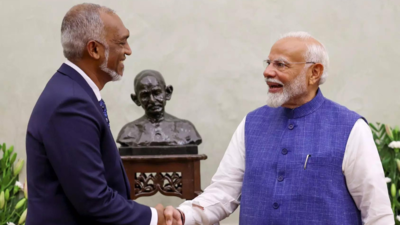
Maldives President Mohamed Muizzu has recently addressed concerns about his administration’s position on foreign military presence in the country, asserting that there is no “India Out” agenda. While speaking at Princeton University during the 79th session of the United Nations General Assembly, Muizzu emphasized that the issue is not about targeting any specific country, but rather about a broader concern regarding foreign military activities on Maldivian soil.
Muizzu stated, “We have never been against any one country at any point. It’s not ‘India Out’.” He pointed out that the Maldivian people have a clear preference: they do not want any foreign soldiers in their nation. This sentiment reflects a growing desire for sovereignty and control over national affairs among the Maldivian populace.
The relationship between India and the Maldives has faced significant challenges since Muizzu, who has a pro-China orientation, assumed office in November of last year. One of the key issues that arose was his request for nearly 90 Indian military personnel, who were operating under three aviation platforms gifted by India, to withdraw from the Maldives. By May 10, India complied with this request, replacing military personnel with civilians to manage a Dornier aircraft and two helicopters.
In addition to clarifying his stance on foreign military presence, Muizzu also took the opportunity to address recent controversies involving his government. He noted that he had acted decisively against deputy ministers who made derogatory comments about Indian Prime Minister Narendra Modi on social media. “No one should say such a thing,” he remarked, underscoring his commitment to maintaining respect for international leaders.
This move came after a backlash from India over the deputy ministers’ comments, which were seen as disrespectful and led to diplomatic tensions. The ministers had criticized Modi in response to a post he made after visiting Lakshadweep, suggesting it was an attempt to promote the Union territory as a tourist alternative to the Maldives.
Muizzu’s remarks are part of a broader effort to manage diplomatic relations while asserting the Maldives’ right to sovereignty. By taking a stand against foreign military presence and promoting respectful discourse, he aims to navigate the delicate balance between international partnerships and national interests.
Overall, Muizzu’s statements reflect his administration’s focus on sovereignty and respectful international relations, signaling a desire for constructive engagement rather than confrontational policies.